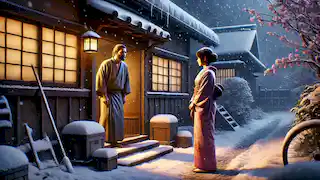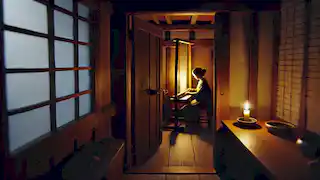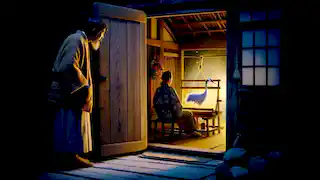The Crane Wife
Reading time: 7 min

About this story: The Crane Wife is a Folktale from Japan set in the Medieval This Poetic tale explores themes of Loss and is suitable for All Ages. It offers Moral insights. A tale of love, sacrifice, and the mysterious bond between man and nature.
Once upon a time, in a small village nestled among the rolling hills of Japan, there lived a humble and kind-hearted man named Takao. Takao lived a quiet life, earning his living by selling firewood he collected from the nearby forest. His home was a modest cottage, with a thatched roof and wooden walls, standing on the edge of the village, just where the trees began to thicken into the deep woods. He had little in the way of wealth, but he was content with the peaceful solitude his life provided.
One winter evening, while the snow fell gently around his small cottage, Takao ventured into the forest to gather more wood to keep his fire burning through the cold night. As he trudged through the fresh snow, his breath puffing out in little clouds, he heard a faint sound—a soft, plaintive cry that broke the stillness of the forest.
Curious, Takao followed the sound until he came upon a beautiful crane. The crane had its wing caught in a hunter's cruel trap, and it struggled feebly, unable to free itself. Its feathers were a pristine white, but they were marred with streaks of blood from its injured wing. Without hesitation, Takao knelt by the bird and gently released it from the trap. He took great care not to hurt the crane further, murmuring soothing words as he worked. Once the bird was free, it stood shakily, its wings trembling.
"Go on," Takao said softly, gesturing toward the sky. "You're free now."
The crane looked up at him with dark, intelligent eyes, as if it understood his words. Then, without another sound, it spread its wings and took flight, disappearing into the falling snow.
Takao watched it go, feeling a strange sense of peace. He returned to his cottage, thinking no more of the incident, and soon the days turned into weeks. The village remained covered in a blanket of snow, and life carried on as it always had.

One particularly cold night, there was a knock at Takao's door. Surprised, for he rarely had visitors, Takao opened the door to find a beautiful young woman standing on his doorstep. She was dressed in a simple, elegant kimono, and her long black hair fell in a thick wave down her back. Her eyes were dark and kind, and her smile was warm despite the frigid air.
"Good evening," she said, her voice as soft as the snow falling outside. "I have traveled far and have no place to stay. Might I take shelter in your home for the night?"
Takao, being a man of generous heart, could not refuse her request. He invited her in and offered her a seat by the fire, where she warmed her hands.
"My name is Yukiko," the woman said, her gaze meeting Takao's. "I have nowhere else to go. Would it trouble you terribly if I stayed a little longer?"
Though Takao lived a simple life, he found himself drawn to the woman's gentle nature and mysterious air. He agreed without hesitation, and soon Yukiko became a fixture in his home. She helped with the daily chores, and her presence brought a warmth to Takao's heart that he hadn't realized he was missing.
Over time, the two grew close, and eventually, Takao asked Yukiko to be his wife. She accepted with a shy smile, and the two were married in a simple ceremony under the watchful eyes of the villagers. Though some whispered about Yukiko's sudden appearance, her grace and kindness won the villagers over, and she quickly became beloved by all who knew her.

One day, not long after their marriage, Yukiko approached Takao with a request.
"I want to weave," she said. "I can make beautiful cloth, but you must promise me one thing: you must never look into the room while I am working. No matter what happens, you must not peek inside."
Takao, though puzzled by the request, agreed without question. He had no reason to doubt his wife's wishes, for she had brought nothing but happiness into his life.
For days, Yukiko worked behind closed doors, and when she finally emerged, she presented Takao with the most magnificent piece of cloth he had ever seen. The fabric shimmered like the morning dew on a spider’s web, with threads so fine they seemed to glow with a life of their own.
"Sell this in the village," Yukiko said, handing the cloth to Takao. "It will fetch a high price."
Indeed, when Takao brought the cloth to the village market, it caused a sensation. The villagers had never seen anything like it, and soon, merchants from far and wide came to purchase the exquisite fabric. Takao and Yukiko grew prosperous, and though Takao's life had changed, he remained as humble as ever.
However, the more cloth Yukiko wove, the weaker she seemed to grow. Each time she retreated into the room to weave, she emerged pale and exhausted. Takao, worried for his wife, tried to persuade her to rest, but Yukiko insisted on continuing her work.
"Please," she would say with a weary smile, "I want to do this for us."

As the days passed, Takao’s concern for Yukiko deepened. He couldn't bear to see her so frail, and one day, his curiosity and worry got the better of him. He quietly approached the door to the room where Yukiko wove, and despite the promise he had made, he opened it just a crack and peered inside.
To his astonishment, there was no woman seated at the loom. Instead, a crane sat there, painstakingly plucking feathers from its own body and weaving them into the cloth. The crane’s movements were slow and laborious, its once-glossy feathers now dull and sparse. The room was filled with the soft sound of feathers being woven into the loom, and Takao's heart sank as he realized the truth.
His wife was the crane he had saved in the forest.
Startled by the door opening, the crane turned its head, and in that moment, Takao felt a deep pang of regret for breaking his promise. The crane rose from the loom, transforming back into Yukiko, who stood before him with tears in her eyes.
"You promised," she whispered, her voice filled with sorrow. "I wanted to stay with you, but now that you know the truth, I cannot remain."
Takao fell to his knees, begging her to forgive him, but Yukiko only shook her head sadly.
"I must go," she said softly, "but I will always be grateful for the kindness you showed me."

With those words, she transformed once again into the crane, her wings stretching wide. She took flight, disappearing into the sky, leaving Takao alone in the silent room. The loom, with its unfinished cloth, sat abandoned, a reminder of the love he had lost.
Years passed, and though Takao continued to live in the village, his heart was never the same. He often wandered to the edge of the forest, looking up at the sky, hoping to catch a glimpse of the crane who had once been his wife. But the crane never returned, and Takao lived the rest of his days with the memory of the woman who had brought him joy, if only for a brief time.
And so, the story of the Crane Wife became legend in the village, a tale told to children on cold winter nights—a story of love, loss, and the fragility of promises.










